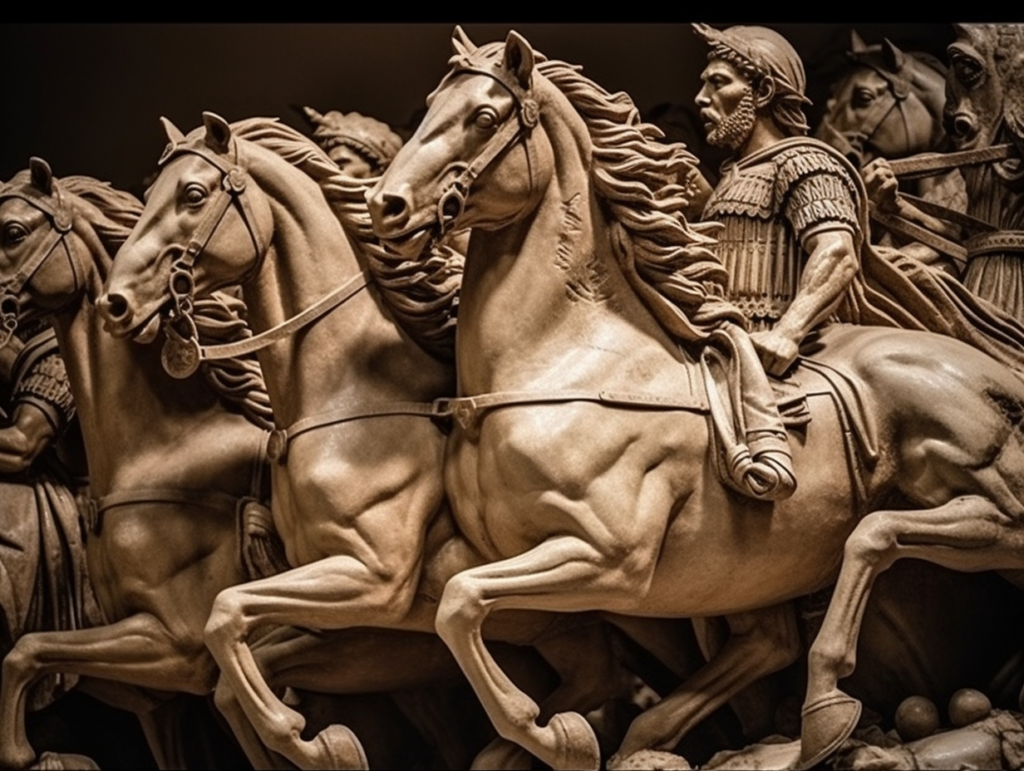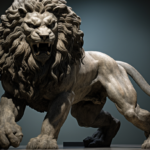Are you ready to dive into the mysteries of the Trojan Wars?
Get ready to unravel the truth behind these ancient conflicts and discover their lasting impact on history.
From the legendary heroes to the cunning strategies employed, this article will guide you through the tangled web of myths and legends surrounding the Trojan Wars.
So, grab your armor and prepare to uncover the secrets of this epic tale.
Key Takeaways
- The Trojan Wars occurred between the late 12th and early 13th centuries BCE and were a series of legendary battles between Troy and Greek city-states.
- The wars were sparked by the abduction of Helen by Paris, resulting in a ten-year conflict and the downfall of Troy.
- Key players in the wars included Achilles, Hector, Agamemnon, and Paris, who played crucial roles in shaping the outcome of the wars.
- The wars involved divine intervention from gods, strategic tactics such as the Trojan Horse, and have had a lasting impact on literature, art, and popular culture.
The Historical Context of the Trojan Wars
You should understand the historical context of the Trojan Wars in order to fully grasp their impact.
The Trojan Wars, which occurred between the late 12th and early 13th centuries BCE, were a series of legendary battles that took place between the city of Troy and an alliance of Greek city-states. These wars weren’t only significant in terms of their military and political implications but also played a crucial role in shaping Greek mythology and literature.
The Trojan Wars were sparked by the abduction of Helen, the wife of Menelaus, by Paris, a prince of Troy. Menelaus, seeking revenge, called upon the Greek city-states to join forces and launch an expedition to retrieve Helen. This conflict lasted for ten years and resulted in the ultimate downfall of Troy.
Understanding the historical context of the Trojan Wars allows us to appreciate the motivations and actions of the key players and heroes of this epic saga. From the valiant Achilles to the cunning Odysseus, each character played a vital role in the unfolding of events. By delving into the historical background, we can gain a deeper understanding of their roles and the impact they’d on the outcome of the wars.
The Key Players and Heroes of the Trojan Wars
The key players and heroes of the Trojan Wars were instrumental in shaping the outcome of the epic battles. One of the most famous heroes was Achilles, a skilled warrior and the central figure of Homer’s Iliad. His unmatched strength and bravery on the battlefield were unmatched, and his rage fueled the conflict between the Greeks and Trojans.
Another prominent figure was Hector, the Trojan prince and greatest warrior on the Trojan side. Known for his courage and noble character, Hector fought valiantly to defend his city against the Greeks.
Other key players included Agamemnon, the leader of the Greek forces, and Paris, the Trojan prince who sparked the war by abducting Helen, the wife of Menelaus.
These heroes and leaders played crucial roles in the Trojan Wars, their actions influencing the course of the conflict and the eventual fall of Troy. As we delve deeper into unraveling the myths and legends of the Trojan Wars, we’ll discover the extraordinary tales of these heroes and the impact they had on history.
Unraveling the Myths and Legends of the Trojan Wars
Delve into the fascinating world of mythology and uncover the hidden truths behind the myths and legends surrounding the Trojan Wars. This ancient conflict has captivated audiences for centuries, but separating fact from fiction can be a daunting task. Here are three intriguing aspects to consider:
- The Role of the Gods: The Trojan Wars weren’t just a clash of mortal armies, but a battleground for divine intervention. Explore the stories of Zeus, Athena, and Aphrodite, and how their actions shaped the outcome of the war.
- The Trojan Horse: Perhaps the most iconic image associated with the Trojan Wars, the Trojan Horse has been the subject of countless retellings. Discover the various theories and interpretations surrounding this legendary stratagem.
- The Tragic Heroes: From the valiant Achilles to the cunning Odysseus, the Trojan Wars were filled with larger-than-life heroes, each with their own flaws and virtues. Unravel the myths surrounding these legendary figures and gain insights into their motivations and fates.
The Strategies and Tactics Employed in the Trojan Wars
As you explore the strategies and tactics employed in the Trojan Wars, you’ll discover the cunning and ingenuity that shaped the outcome of this ancient conflict. The Greeks, led by Agamemnon, devised a plan to infiltrate the impenetrable walls of Troy. One of their most famous strategies was the construction of the Trojan Horse. This colossal wooden horse was presented as a gift to the Trojans, who unsuspectingly brought it inside their walls. Little did they know that Greek soldiers were hiding within, ready to strike at nightfall. This clever tactic allowed the Greeks to breach the city’s defenses and ultimately secure victory.
Another key strategy employed by the Greeks was the use of deception and misdirection. They employed false retreats, luring the Trojans out of their protective walls and into open battle. This allowed the Greeks to engage the Trojans on their terms, using their superior numbers and combat skills to their advantage. The Trojans, in turn, relied heavily on their defensive capabilities, utilizing their formidable city walls and archers to repel the Greek forces.
The Trojan Wars weren’t solely fought on the battlefield. Both sides also engaged in diplomatic negotiations and alliances with neighboring kingdoms. The Greeks, for instance, formed alliances with various city-states, including Sparta and Mycenae, to strengthen their forces. The Trojans, on the other hand, sought support from allies such as the Amazons and the Thracians.
The Enduring Legacy of the Trojan Wars
Explore the lasting impact of the Trojan Wars and discover the profound influence they’ve had on literature, art, and culture throughout history. The legacy of the Trojan Wars is far-reaching and continues to captivate the imagination of people across the globe.
Here are three key aspects of their enduring legacy:
- Literature: The Trojan Wars have inspired countless literary works, from the epic poems of Homer’s ‘Iliad’ and ‘Odyssey’ to modern retellings such as Margaret Atwood’s ‘The Penelopiad’ and David Malouf’s ‘Ransom.’ These stories not only entertain but also offer insights into human nature, honor, and the consequences of war.
- Art: The Trojan Wars have been a popular subject in art for centuries. From ancient Greek pottery depicting the heroes and events of the war to Renaissance paintings like Botticelli’s ‘The Birth of Venus,’ the conflict has served as a rich source of inspiration for artists seeking to capture its drama and mythological significance.
- Culture: The Trojan Wars have left an indelible mark on popular culture. Whether it’s the phrase ‘beware of Greeks bearing gifts’ or the use of the Trojan Horse as a metaphor for deception, references to the war and its characters are prevalent in everyday language. Additionally, the story of the Trojan Wars has been adapted into various forms of entertainment, including films, plays, and video games, ensuring its continued relevance in modern society.
The enduring legacy of the Trojan Wars is a testament to their timeless appeal and the profound impact they’ve had on the world of literature, art, and culture.
Frequently Asked Questions
How Were the Trojan Wars Portrayed in Ancient Greek Literature and Art?
In ancient Greek literature and art, the Trojan Wars were portrayed as epic battles between the Greeks and Trojans. These depictions showcased the heroism of warriors like Achilles and Hector, and the tragic consequences of the war.
What Was the Role of Women in the Trojan Wars?
The role of women in the Trojan Wars was complex. They served as wives, mothers, and daughters, providing emotional support and motivation for the warriors. Some women, like Helen and Hecuba, played pivotal roles in the conflict.
What Were the Long-Term Consequences of the Trojan Wars on the Greek City-States?
The long-term consequences of the Trojan Wars on the Greek city-states were significant. They led to a shift in power dynamics, political and social changes, and the emergence of new leaders.
Did the Trojan Wars Have Any Impact on Neighboring Civilizations?
The Trojan Wars did have an impact on neighboring civilizations. The conflict disrupted trade routes and alliances, causing ripple effects throughout the region. These consequences would shape the relationships between neighboring civilizations for years to come.
Are There Any Archaeological Findings That Provide Evidence of the Trojan Wars?
Are there any archaeological findings that provide evidence of the Trojan Wars? Yes, there have been discoveries such as the ancient city of Troy and the artifacts found there, which support the existence of the Trojan Wars.







